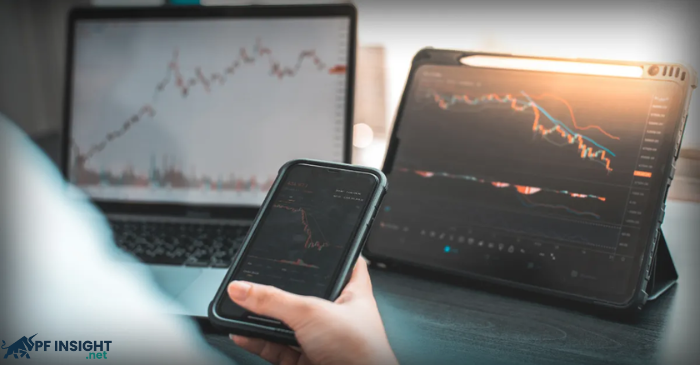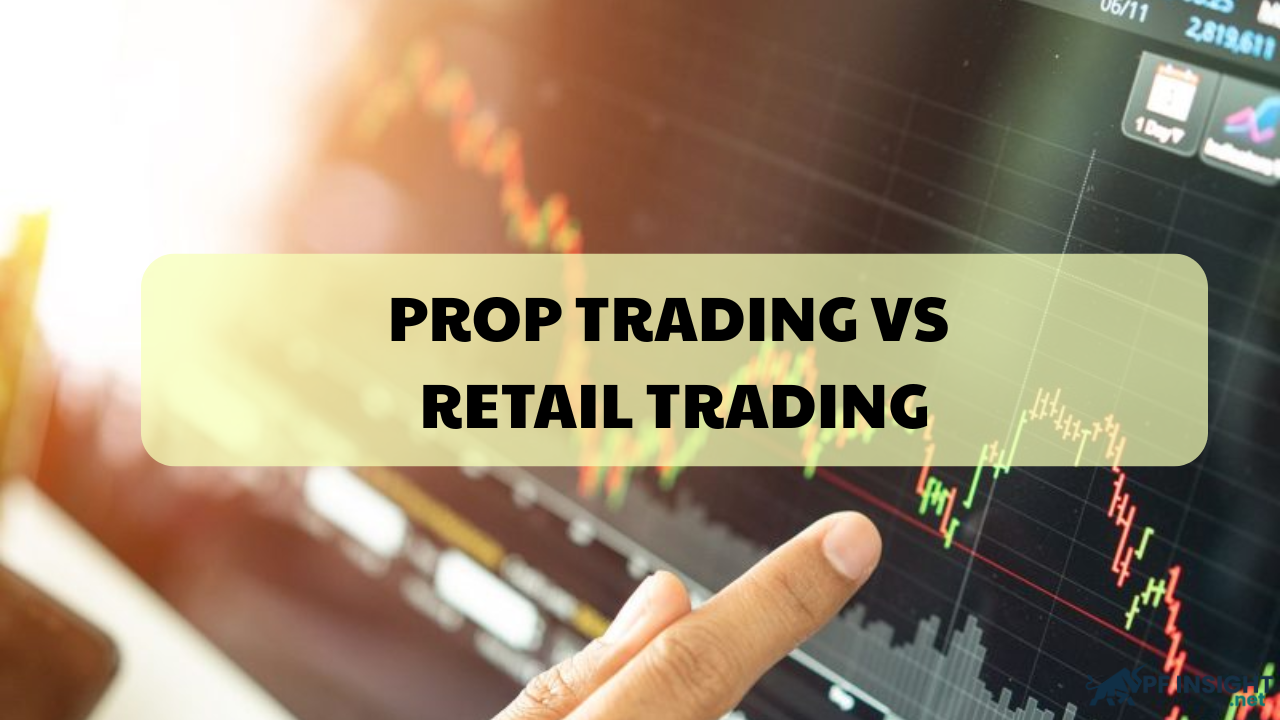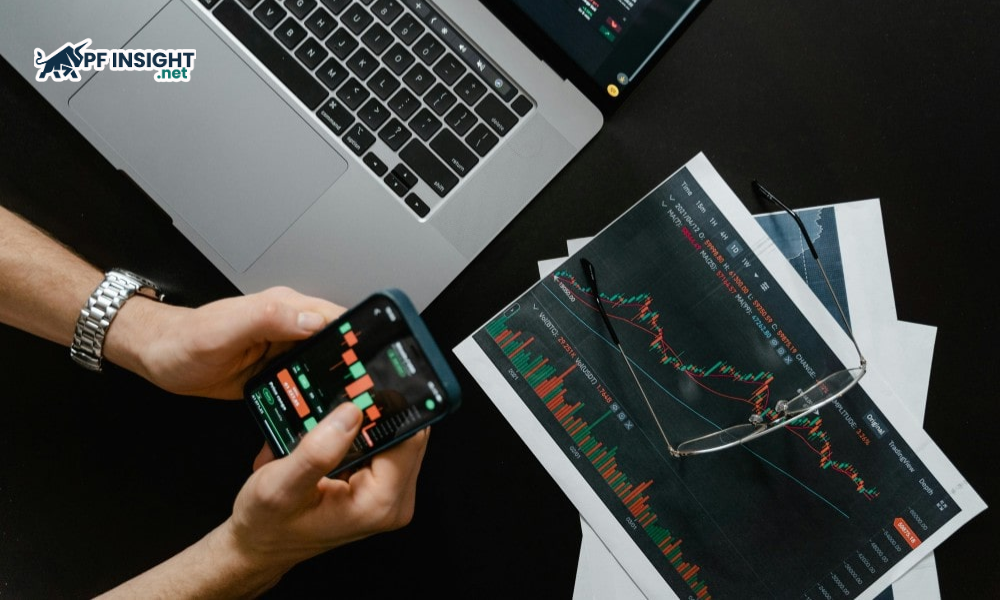The financial market is developing more and more, with new forms of investment emerging to meet the increasing demands of traders. Among them, prop trading vs retail are two of the most popular investment models today. So, what exactly is prop trading vs retail? What are the differences between prop trading vs retail? Let’s explore these questions with Pfinsight.net in today’s article.
What is Prop trading vs retail trading?

What is Prop trading?
Prop trading is a trading model in which proprietary traders use the company’s capital instead of their own to trade. When traders implement trading strategies within predefined risk limits, they are granted access to trading accounts, platforms, and capital. Trading profits are usually shared according to predetermined criteria and terms.
Proprietary trading firms use trading tests or evaluation processes to assess a trader’s performance. Traders who meet the requirements are given funded accounts and are free to trade according to the company’s policy.
Proprietary firms earn revenue from two main sources: fees paid by applicants to take the test and a portion of profits shared with profitable traders. Their operational structure is often simpler and requires fewer legal obligations in most jurisdictions because there is no client fund management. However, to limit risks and maintain operational integrity, many proprietary firms still implement internal controls and compliance requirements.
What is Retail trading?
In retail forex trading, individual traders open accounts with licensed brokerage firms to access the forex market. Traders use the broker’s interface to place orders after depositing funds into their accounts. Market access, liquidity, leverage, margin, and order execution are some of the trading infrastructure provided by brokers.
Retail brokers make money through spreads, commissions, or a combination of both. To attract and retain clients, some also offer additional services such as trading tools, market research, or educational materials.
Key differences between Prop trading vs retail trading

Prop trading vs retail trading – Source of trading capital
A notable aspect is that proprietary brokers do not manage client money. Proprietary firms use their own capital for trading activities, unlike traditional brokers, who handle and safeguard client funds. By eliminating the need to manage client deposits, this approach simplifies the operational aspects of the business.
Proprietary firms can focus resources more effectively on core trading activities because they do not need to handle account balances, process deposits, or withdrawals for each client. This can increase operational flexibility and the ability to quickly adapt to market changes.
Prop trading vs retail trading – Risk management
In retail forex trading, individual traders bear all the trading risks. Without experience, they can easily incur losses and even wipe out their entire capital. Aside from standard risk management procedures, a trader’s actions do not affect the broker’s finances.
Risk management in proprietary trading is conducted at the company level. Proprietary firms invest heavily in monitoring trading activity, implementing automated risk controls, and enforcing position limits because their own capital is at stake. Many require traders to adhere to strict guidelines on position sizing, stop-loss orders, and daily loss limits. To monitor and manage real-time risk, some funded trading firms also integrate third-party risk management solutions.
Prop trading vs retail trading – Regulatory requirements
Prop trading companies are exempt from many standards and legal obligations that traditional brokers must comply with since they do not hold client assets. As a result, proprietary trading firms can focus more on improving performance and trading strategies instead of worrying about maintaining and safeguarding client investments.
Experts are currently engaged in an intense debate over how regulators will respond to the growing demand for proprietary trading solutions. It is almost certain that regulations for prop trading companies will soon be introduced, regardless of differing opinions on the future legal framework.
Therefore, adhering to general ethical standards and maintaining mutual respect for clients is crucial for the development of proprietary firms, along with building open, honest, and trustworthy relationships from the start.
Prop trading vs retail trading – Client acquisition and conversions
When it comes to attracting new clients, retail brokers often face significant challenges. Traders must deposit their own money into an account, bear all the risks, and go through a learning curve. These factors cause hesitation, especially among newcomers.
Proprietary firms use a different approach to attract traders. Skilled traders who lack significant personal capital are often drawn to funded accounts. Proprietary firms provide capital to traders based on their performance instead of requiring large deposits. This makes the structure attractive to experienced traders who may not have sufficient funds to trade on their own.
Prop trading vs retail trading – Exposure risks
In proprietary trading, the firm bears all the risks. The company is exposed to the risk of each trade as soon as the trader is funded. Therefore, strict risk control measures are implemented from the outset. The firm must balance between protecting and providing capital, which is why monitoring systems, position limits, and daily loss criteria are essential.
Advantages of prop trading vs retail

- Better capital access: Prop trading firms provide traders with access to much larger capital than they could personally afford, enabling them to scale strategies and take bigger positions.
- Lower trading costs: Proprietary firms often offer access to institutional-level pricing, reducing trading costs, whereas retail traders usually face higher commissions and wider spreads.
- Professional risk management: Proprietary brokers help traders minimize losses and instill disciplined trading habits by enforcing strict risk management criteria.
- Networking and collaboration: Firms like WeMasterTrade provide a collaborative environment where traders can exchange ideas, learn from seasoned professionals, and refine their strategies.
- Clear growth path: As traders achieve consistent success, many proprietary firms offer structured plans to grow accounts and share profits.
- No personal financial risk: Proprietary traders use company funds, meaning they do not face personal losses beyond evaluation fees, unlike retail traders who must risk their own money.
Common mistakes when switching from retail trading to prop trading
Transitioning from retail to proprietary trading requires not only technical expertise but also discipline, adaptability, and a deep understanding of the proprietary environment. Many traders struggle with this shift because they often make mistakes that hinder their progress. Identifying and addressing these issues early can increase long-term success.
- Overleveraging: Proprietary traders may be tempted to take excessive positions due to access to larger capital. Poor leverage management can quickly lead to drawdowns and even account closure. Sustainability depends on adhering to strict risk limits and disciplined position sizing.
- Ignoring firm-specific risk rules: All proprietary firms impose strict rules such as daily loss limits and maximum position sizes. Violating these can result in immediate termination. Understanding and following these guidelines ensures compliance and sustainability within the firm.
- Expecting instant success: Many traders assume proprietary trading will immediately increase profits. However, it takes time to adapt to strict limitations, evaluation processes, and performance standards. A methodical, long-term growth approach is essential.
- Choosing the wrong prop trading company: Opportunities, risk profiles, and support networks vary across firms. Selecting a firm that doesn’t align with your trading style can lead to frustration and setbacks. Ensure the company offers fair profit splits, strong resources, and robust trader development programs by conducting thorough research.
Conclusion
The above provides a comprehensive overview of the differences between prop trading vs retail. Hopefully, through this article, you now have a clearer understanding and can choose the investment model that suits you best. Don’t forget to visit our website for more useful information. Wishing all traders success!







